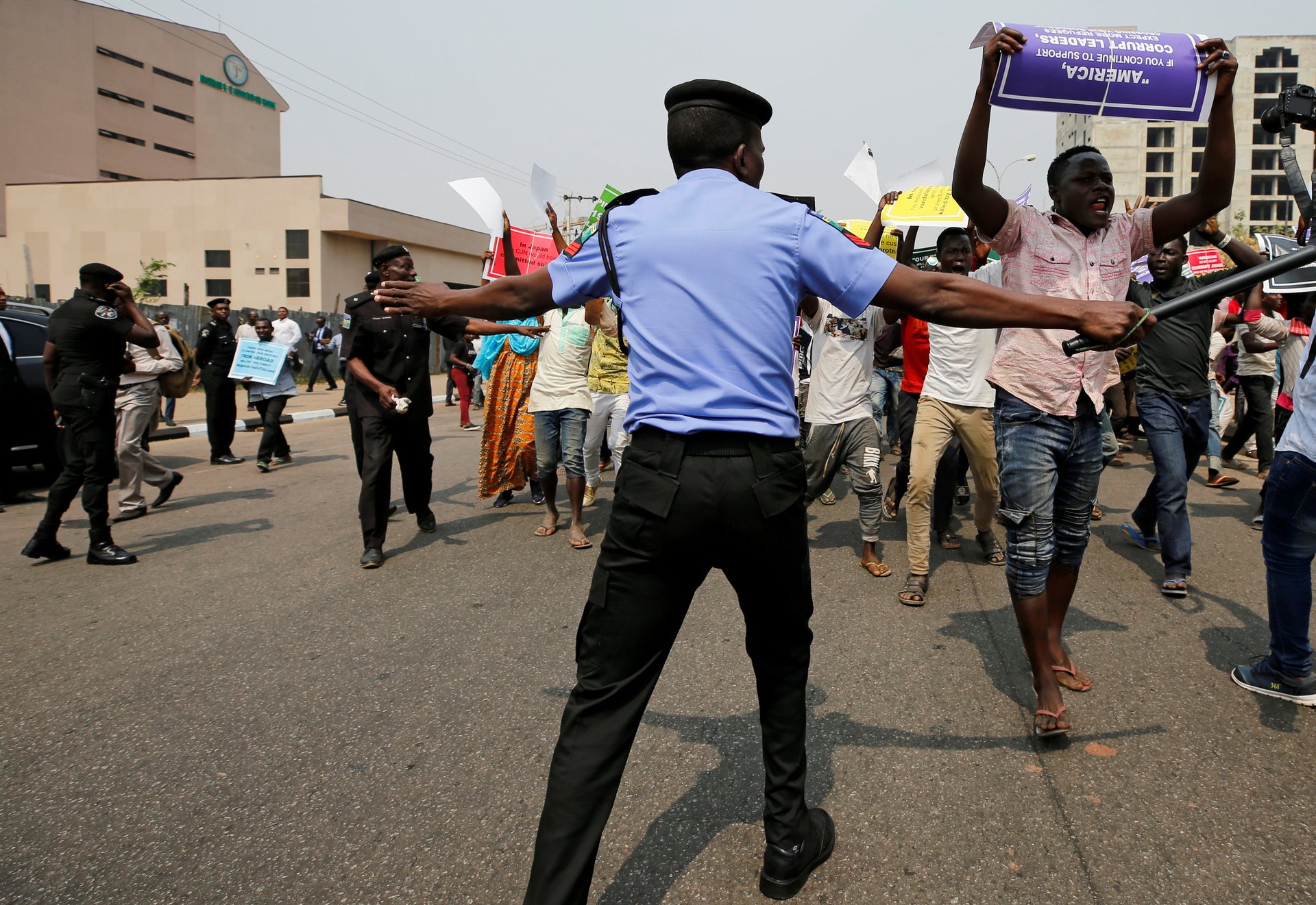Ordinary Nigerians are leading the charge to reform the country’s corrupt police force
It’s quite common to hear stories of people arrested and detained by the police on frivolous charges in Nigeria.


It’s quite common to hear stories of people arrested and detained by the police on frivolous charges in Nigeria.
If arrested, regaining your freedom often depends on if you can afford to pay the bail fees randomly set by the police or you can expect to be detained indefinitely—and much of the process usually happens without a lawyer present or involved.
The Nigerian police’s arbitrary arrests gained global infamy last year when the #EndSARS campaign calling for the scrap of a special anti-robbery unit known to harass and extort citizens grabbed local and international headlines. The campaign bore some fruit with the government ordering a review of the unit but activists say that’s not a permanent fix.
Notably, police reforms have not been a dominant campaign issue among leading candidates with Nigeria’s elections less than two weeks away even though the police is Nigeria’s most corrupt public institution and was ranked as the worst globally in the 2016 World Internal Security and Police Index.
That ambivalence from Nigeria’s political class means civil society advocates are leading the push to reform the country’s police force.
A central pillar of any reform lies in updating the antiquated laws governing the police force which have seen little “comprehensive review” since being enacted in 1943, says Nkiru Uzodi, senior program manager at Policy and Legal Advocacy Center (PLAC), a governance-focused non-profit.
To this end, PLAC is working with the senate committee on police affairs to create and propose a bill setting out updated methods, including making regular training programs for police officers mandatory, defining the protocol for public searches of individuals and clarifying grounds for reasonable suspicion requiring such searches. The big hope, Uzodi says, is to produce “better trained police officers who are clear on their duties and are better informed.”
Filling the gap
The effect of the police’s culture of arbitrary arrests and detention without a lawyer present are highlighted by one shocking stat: 72.5% of Nigeria’s total prison population are inmates serving time without being sentenced.
One way to reduce the spate of pre-trial detention is to double down on the “police duty solicitor scheme” that’s already been piloted by the police, says Kemi Okenyodo, a longtime campaigner for police reforms. Under the scheme, lawyers participating in the compulsory one year national service program are posted to police stations to act as solicitors and tasked with ensuring that detentions are legally processed.
The scheme, a “low hanging fruit,” as Okenyodo describes it, has been trialled but is yet to be fully implemented.
In the absence of government processes that ensure proper legal representation, a startup providing on-demand legal services is filling the gap. MyLaw.ng, an aggregator of lawyers and law firms, has created a subscription-based emergency legal service that allows anyone arrested request a nearby lawyer—the same way they’d hail an Uber.
The service is mainly targeted at young people, who often bear the brunt of wrongful arrests by police officers who accuse them of offenses based on warped profiling. For instance, a young man with a laptop can be accused of being an internet fraudster while wearing a short skirt can get a lady accused of prostitution.
says Taiwo Adedokun, team lead at MyLaw. Given how frequently these arrests happen and the uncertainty that surrounds what comes after, MyLaw sells its emergency legal service “like insurance” with users paying around an annual $25 premium for access to the service.
While having a lawyer involved in the process of arrests and detention can be taken for granted in several countries, in Nigeria it can be the difference between having a flimsy arrest quickly resolved or worse. In extreme cases, young people unfamiliar with their rights can “self-incriminate” under duress, possibly leading to being perpetually jailed without a sentence, Adedokun says.
Trust issues
The bill for police reform won’t have a straightforward passage. Getting the bill passed is one thing, ensuring its key components are enforced is quite another, says Okenyodo whose skepticism is rooted in witnessing a lack of follow-through with police top brass on several pilot programs.
“The biggest stumbling block is a lack of commitment,” she says. For instance, unless the government and the police leadership ensure new policies reflect through the police rank and file, with regular training and sanctions, they are unlikely to stick.
But amid the reform efforts, the police will also have to repair its badly damaged trust among the public. To do this, Uzodi says community policing methods will also be entrenched in the new bill. “The idea is to improve relationships between Nigerians and the police by having regular town-hall meetings and engaging them.”
For any of this to have significant chance of long-term success though, Oyenkodo says the government will need reduce its dependence on non-profits to do the hard work of sensitizing police officers. ”[There’s] too much of emphasis on civil society groups. We are not the government.”
Sign up to the Quartz Africa Weekly Brief here for news and analysis on African business, tech and innovation in your inbox